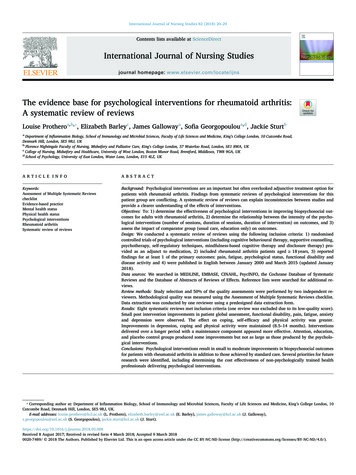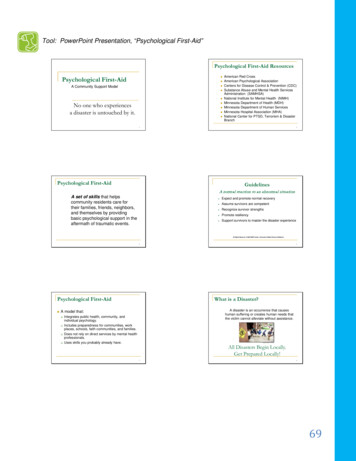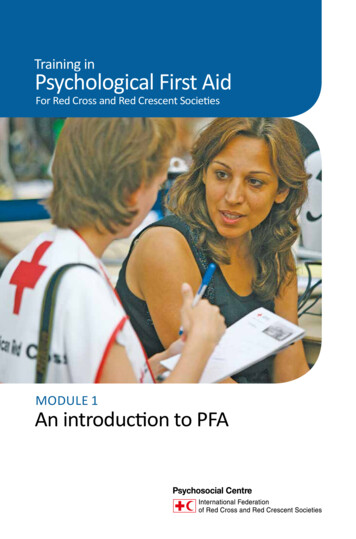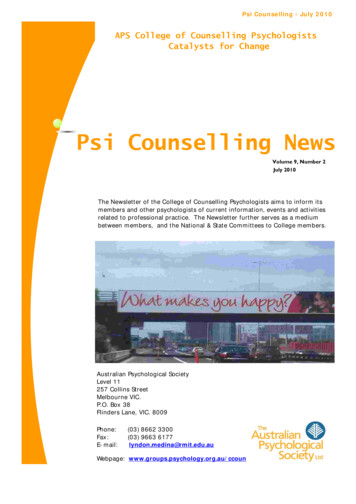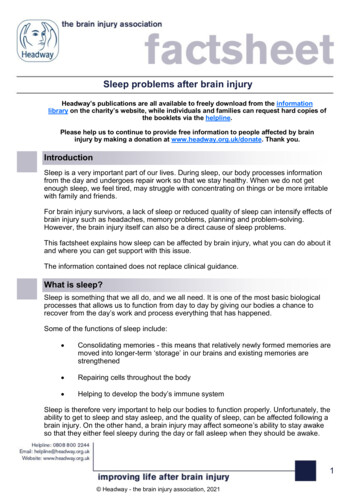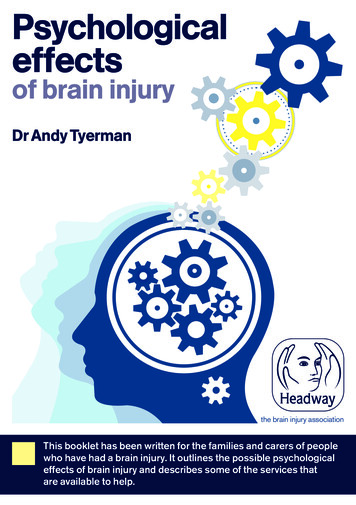
Transcription
Psychologicaleffectsof brain injuryDr Andy Tyermanthe brain injury associationThis booklet has been written for the families and carers of peoplewho have had a brain injury. It outlines the possible psychologicaleffects of brain injury and describes some of the services thatare available to help.
n Psychological effects of brain injuryThis e-booklet is an adaptation, created in March 2018, of the Headway print booklet Psychologicaleffects of brain injury and may contain minor updates to the original version.published byHeadway – the brain injury associationBradbury House, 190 Bagnall RoadOld Basford, Nottingham NG6 8SFAuthor: Dr Andy Tyerman, Consultant ClinicalNeuropsychologist, Community Head Injury Service,Buckinghamshire Healthcare NHS Trust, Aylesbury,Buckinghamshire.Editor: Tamsin Ahmad, Publications and Research Manager,Headway – the brain injury association.Previously edited by Esme Worthington and Richard Morris.All rights reserved. No part of this publication may be reproduced, stored ina retrieval system, or transmitted by any means, electronic, mechanical,photocopying, recording or otherwise, without prior permission in writingfrom the copyright owner. Headway – the brain injury associationSixth edition. First published 2003. Revised 2006, 2012, 2016 & 2018.ISBN: 978-1-873889-26-8Printed in the UK by Phase PrintThis booklet received a Highly Commendedaward at the British Medical AssociationPatient Information Awards 2010.
Headway – the brain injury association nContentsIntroduction . 2Cognitive impairment . 4 Memory function. 5 Attention and concentration. 6 Speed of information processing. 7 Language skills . 7 Perceptual skills . 8 Spatial and constructional skills. 8 Executive function. 9 Awareness and insight . 9Behavioural and emotional changes.10 Behavioural changes. 10 Emotional changes . 13 Changes in self-concept. 14Work, social and family changes .16 Occupational changes. 16 Leisure and social activities. 17 Family relationships . 18Psychological services. 20 Cognitive assessment. 20 Cognitive rehabilitation . 21 Behavioural management. 22 Social skills training. 22 Psychological counselling. 23 Individual psychotherapy. 24 Family therapy. 25Conclusion . 26Further reading . 27Useful organisations . 28Who’s who in treatment and rehabilitation .30How to donate . 32About Headway . 331n
n Psychological effects of brain injuryIntroductionThis booklet has been written to offer information on thepsychological effects of brain injury. The term psychologicaleffects refers to the cognitive, behavioural and emotional effectsand associated family, occupational and social impact of braininjury. Each of these issues is discussed in turn.Clinical neuropsychologists are the professionals trainedspecifically to assess and address these difficulties. However,there are a range of other professionals also involved insupporting people with psychological effects of brain injury. Thebooklet therefore concludes with a summary of ‘Who’s who intreatment and rehabilitation’.A brain injury can result in a confusing array of psychologicalchanges. These range from subtle and temporary lapses in abilityand behaviour, to a profound and permanent reduction in basicskills and loss of control of emotion and behaviour.Sustaining a brain injury can be a devastating experience for boththe individual concerned and their family and friends. The impactis all the more confusing due to the lack of public awareness ofthe nature and effects of brain injury. To learn that a loved one,whose life may be in danger, has sustained a brain injury isintensely distressing for the family. When the person hasrecovered sufficiently to recognise that he or she has sustained abrain injury, this can be both disturbing and a threat to theirpersonal identity.n2
Headway – the brain injury association nHaving weathered the immediate crisis following the brain injury,there may follow a long struggle to regain physical, cognitive andsocial skills. The process of recovery may continue for manyyears, often with a remarkable degree of improvement. Specialistneurological rehabilitation facilities may be required for those withmore severe injuries, but for many, even prolonged periods ofintensive treatment will not ensure a restoration of previous skillsand lifestyle.Headway information and supportIf you wish to talk to someone about any of the information in thisbooklet, contact the Headway helpline on 0808 800 2244 orhelpline@headway.org.uk (Monday - Friday, 9am - 5pm). Thehelpline can offer information about brain injury and a listening earif you need emotional support. They can also send out limitedfree copies of publications and provide details of Headwaygroups and branches.3n
n Psychological effects of brain injuryCognitive impairmentAll those with a moderate to severe brain injury are likely tohave some difficulties with their cognitive skills, at least in theearly stages of recovery, as will some people with minor injuries.The most common cognitive problems after brain injury involveconcentration, memory and general speed of thought. However, abroad spectrum of cognitive skills may be affected, includingperception, language and the awareness of self and others. A setof skills known as ‘executive functions’, including planning,organisation, multi-tasking and flexible thinking, is also commonlyaffected and this can be particularly debilitating.Soon after injury, whether in the hospital or home environment,the demands on the person with a brain injury can be relativelylimited, and so the presence of subtle cognitive changes may notbe readily apparent. Their memory of the distant past and theirestablished prior knowledge (e.g. educational skills) may appearto be relatively unaffected. The person may therefore seem tohave no obvious problems when holding general conversationsabout familiar topics. However, problems may later becomeapparent during formal neuropsychological assessment, duringactive rehabilitation or on returning to work.While cognitive difficulties generally show marked improvementduring the course of recovery, some degree of permanentimpairment is common amongst those with a more severe injury.This can often prevent or hamper a person in returning to theirprevious employment, studies or lifestyle.n4
Headway – the brain injury association nMemory functionMemory problems take many forms and are the major area ofdifficulty after brain injury for many people. Memory problemsusually include a period of amnesia surrounding events that tookplace before and after the injury, and difficulty in rememberingnew information.Retrograde amnesiaThe loss of memory for events leading up to the injury is known asretrograde amnesia. People with a brain injury rarely recall thecircumstances of their injuries. Retrograde amnesia may extendfrom just a few seconds to minutes, hours, days, weeks, or evenlonger. In addition to the period of total amnesia, peoplefrequently complain of incomplete or vague recall spanning days,weeks, or months before their injury. However, they may be ableto recall some of this information when prompted by family orfriends. In extreme cases, when the period of retrograde amnesiaextends to a period of years, this is very disturbing for the personand distressing for their relatives.Post-traumatic amnesiaThe period of confusion and memory loss that follows the injuryis known as post-traumatic amnesia (PTA). This covers theperiod of time from the injury until the person starts to regainsome continuity in their memory function and retain someinformation. This may range from a few minutes (after a mildinjury), to a period of weeks, months or years (after a very severeinjury). In post-traumatic amnesia, people may be able to hold asensible conversation about familiar subjects, such as theweather or something that has just happened, but thenremember nothing afterwards.5n
n Psychological effects of brain injuryNew memories and new learningPeople with brain injury commonly experience some degree ofdifficulty in learning and remembering new information. Thisranges from occasional forgetfulness to an inability to recall basicinformation, such as personal and family details, currentcircumstances, and daily routines. Many people with a severeinjury report problems in learning and remembering names,messages, appointments, routes, and plots of books or televisionprogrammes, etc. People with more severe memory difficultiesmay forget where they are going or what they are doing, and maybe dependent on family members to remind them of dailyactivities. In contrast, memory for the long-term past (such asschool, work and family history) may be well retained. For further information on memory function, see theHeadway booklet Memory problems after brain injury.Attention and concentrationAnother common complaint is that of difficulty in attending to ormaintaining concentration or interest in activities. While somepeople with brain injury struggle specifically with tasks requiringdivided attention or multi-tasking, many others find that theirconcentration and train of thought is easily disrupted, for exampleby noise or interruptions. They may have to start an activity overagain, or ask for information to be repeated. Difficulties withattention and concentration can have far-reaching effects onwork, leisure, and social activities. Such problems may beworsened when the person is tired or uninterested in the subjectmatter.n6
Headway – the brain injury association nSpeed of information processingPeople also commonly experience a reduction in their speed ofthought and their responses, even after a relatively minor braininjury. They may find, for example, that they are unable to take innew information as quickly as they used to. They may often findthemselves left behind by conversations or televisionprogrammes, slow to read newspapers or books, sluggish in theirreactions, or generally slow at work or in their leisure activities.Language skillsWhile severe loss of language skills is relatively uncommon aftergeneralised brain injury, people may have word-finding difficultiesand may experience a reduction in their vocabulary. People mayalso experience difficulties in organising their communication andexpressing themselves, especially when conveying complexideas. More marked difficulties in understanding and expressinglanguage are common after more localised damage to languagesensitive parts of the brain, for example after a stroke or a bleedfollowing traumatic brain injury. People may have difficultyrecognising speech sounds, identifying individual words, orbreaking down the structure of sentences to extract the meaning.People may also have difficulty in selecting and expressing wordsor in constructing sentences. Specific difficulties with reading,writing or spelling may also occur. For further information on language skills, see theHeadway booklet Coping with communication problemsafter brain injury.7n
n Psychological effects of brain injuryPerceptual skillsPeople with severe brain injury may have problems with one ormore of their senses, and/or difficulties with their perceptual skills(i.e. their ability to interpret the information they receive from theirsenses). The most commonly reported perceptual problems arevisual – involving the ability to recognise and identify objects,faces, and other visual material. These problems may becomplicated by double vision, loss of co-ordination of themuscles controlling eye movements, or a reduction in theperson’s field of vision. Perceptual problems are not, however,confined to vision. Parallel problems in auditory (hearing) or tactile(touch) perception may occur, whereby the person has difficultyidentifying and recognising sounds or sensations.Spatial and constructional skillsPeople with brain injury may perceive objects accurately, but havedifficulty with their spatial skills – i.e. in judging spatialrelationships between two or more objects, or betweenthemselves and objects in their environment. This may lead tothem misjudging distances (e.g. reaching out to pick somethingup and missing), perceiving things the wrong way around (e.g.trying to read a newspaper upside down), confusing left and right,or having difficulty in locating objects or following even familiarroutes. Occasionally people may fail to respond to stimuli comingfrom their left or right or may ignore a particular side of their body,for example when shaving or dressing. This is known as visualneglect. There may also be problems with constructional skills(e.g. in copying or drawing, completing puzzles/jigsaws/models,or in household tasks such as DIY). Others may retain spatial andconstructional skills but have difficulty in completing complexactivities, e.g. dressing or cooking, in the right order.n8
Headway – the brain injury association nExecutive functionPeople with a brain injury often experience difficulties withexecutive skills – that is, in planning, problem solving, reasoning,decision making, and self-monitoring. In general conversationthey may lose their train of thought and go off at a tangent. Othersmay be inflexible in their thinking, repeating one rigid opinion andfailing to appreciate other people’s points of view. This meansthat conversations can be frustrating and unrewarding for others,particularly when the same conversation is repeated severaltimes. It may be hard for a person with brain injury to identify andanalyse problems, think of possible solutions, make decisions,and implement coping strategies. They may also be poor atplanning, monitoring and evaluating their performance, andorganising their lives effectively. For further information see the Headway factsheetExecutive dysfunction after brain injury.Awareness and insightThe awareness of oneself and of others can be profoundlyaffected by brain injury. People with brain injury may be unawareof how they are presenting themselves and can lack insight intotheir difficulties. This is particularly common in the early stages ofrecovery. As people recover, they may gradually regain their selfawareness and insight into their more obvious problems (such asmobility, speech or memory), but may never achieve insight intomore subtle changes in their skills or behaviour. They may, as aresult, fail to pick up on hints or social cues and may thereforemisjudge social situations, appearing clumsy in their social skillsand inappropriate in their behaviour. For further information see the Headway factsheet Lackof insight after brain injury.9n
n Psychological effects of brain injuryBehavioural andemotional changesBrain injury can result in a wide range of emotional andbehavioural changes. These reflect a combination of organicdamage and psychological reactions to the injury and itsconsequences. Primary changes due to damage to the brain(such as irritability and impulsivity) interact with secondaryreactions to these (such as frustration, loss of confidence anddepression). Such reactions are similar to those experienced byother injured or stressed people, but are influenced by thecognitive, behavioural and emotional changes that arise directlyfrom the brain injury.While behavioural and emotional changes are very common aftersevere brain injury, some people with a more minor injury sufferpost-concussion syndrome, which comprises a constellation ofsymptoms including dizziness, headache, fatigue, irritability, andpoor memory and concentration. This is usually short-lived, butmay persist with subtle changes in cognition, behaviour oremotion, of which only the person or their close family may beaware. Where such changes are not acknowledged orappropriately managed, this can add to the anxiety of the personand their family and can lead to long-term emotional difficulties.People may appear to have recovered well after a brain injury, andyet be left with the disconcerting feeling that they are not quite theperson they once were.Behavioural changesBehavioural changes after brain injury are many and varied.Some appear to be an exaggeration of previous personalityn 10
Headway – the brain injury association ncharacteristics, while others may seem completely out ofcharacter for that person.DisinhibitionA common change early in recovery is disinhibition, that is, loss ofcontrol over behaviour, resulting in socially inappropriatebehaviour. This ranges from a tendency to divulge personalinformation too freely, to disturbing and unpredictable outburstsof uncontrolled rage. Common complaints include a tendency tomake tactless remarks, to laugh inappropriately, and to be overfamiliar towards others. A major area of difficulty, especially earlyin recovery, is that of sexual behaviour – making inappropriatesexual advances or remarks. Abusive or crude language maycause offence and be acutely embarrassing for relatives or insocial situations. Most people gradually regain control over theirbehaviour, but those with a severe injury may remain impulsiveand/or inappropriate in their actions. A few people never regainadequate control over their behaviour, remaining unpredictable,aggressive, and reliant on others to exercise a degree of controlover their behaviour.Irritability, frustration and aggressionPerhaps the most common behavioural change after brain injuryis that of increased irritability. People with a brain injury are oftenimpatient, intolerant of others’ mistakes, and easily irritated byinterruptions, such as noise from children or machinery, whichdisrupt their concentration. They are frequently reported to beshort tempered, for example when things do not work out asexpected or where there are differences of opinion with family orwork colleagues.Many people with brain injury become frustrated by the slow rateof recovery and some also remain angry with anyone held11 n
n Psychological effects of brain injuryresponsible for their injury. When a build up of irritability,frustration and anger is combined with loss of behavioural control,it may result in outbursts of verbal or physical aggression. Somepeople with brain injury experience sudden and unpredictableoutbursts of uncontrolled rage without any warning, often knownas ‘episodic dyscontrol’. For further information see Headway booklet Managinganger after brain injury.Apathy and loss of initiativeIn contrast with those who exhibit poor control over theirbehaviour or increased irritability, some people with a brain injurymay become passive, unresponsive and lacking in initiative.Some people may appear unconcerned and even unaware oftheir difficulties, especially in the early stages of recovery.Others may appear interested and have good intentions to carryout activities, but are unable to organise themselves and initiateaction. This may happen to any of us when feeling depressed, butfor the person with a brain injury, this can result directly from theinjury itself rather than solely as a result of depression.EgocentricityPeople may also become egocentric after brain injury, tending tobe self-centred and appearing not to consider the feelings orneeds of their family and friends. In adversity, it is common foranyone to tend to focus on their own needs, but this can begreatly exaggerated for a person with a brain injury. Cognitiveimpairments can mean that they are oblivious to, or unable toappreciate, others’ points of view, and they may be unaware ofthe needs of others.n 12
Headway – the brain injury association nEmotional changesThe emotional impact of brain injury depends upon theindividual's previous personality and coping skills, theirappreciation of their own difficulties, and the family andprofessional support that is available to them, as well as thenature of the brain injury.LabilityIn parallel with their loss of behavioural control, many people witha brain injury experience loss of emotional control. They may reactstrongly and unpredictably to events which would not previouslyhave troubled them, and may also be subject to rapid and markedswings in mood - for example, being happy and joking one minuteand tearful the next.DepressionDepression is a common emotional reaction to a brain injury. Forsome this may be an early reaction to the trauma of the injury andsubsequent disability, whereas for others it may develop as theystruggle painfully and seemingly helplessly to regain their lostskills. Commonly, depression presents itself when activetreatment is complete and the person returns home, only to beconfronted by the realisation that life will probably never be as itwas before. The loss of former physical, cognitive, and socialskills, the impact on personal relationships, and the fact that theyare unable to return to their previous leisure and social activitiesor fulfil their former work aspirations, can be extremely hard toaccept, and can understandably lead to depression. For further information see Headway factsheetDepression after brain injury.13 n
n Psychological effects of brain injuryAnxietyMany people suffer from anxiety after brain injury, which impactsupon their daily lives and may obstruct their rehabilitation. Thosewith a less severe injury may be anxious early in recovery, feelingdisturbed by the changes to their cognitive skills and personality.People with a more severe injury may become anxious later on,when they come to appreciate the extent of their long-termdisability and feel anxious about the future. A few who sufferanxiety may become obsessional in their thoughts and actions.Post-traumatic stress disorderSome people may experience post-traumatic stress disorder(PTSD). This is a severe psychological reaction to a traumaticevent. It involves the persistent re-experiencing of the trauma,avoidance of stimuli which remind the person of the event,increased arousal, and a numbing of emotional responses. Lossof memory for the circumstances of the injury means that mostpeople with severe brain injuries are not troubled by disturbingmemories of the event. As such, PTSD is most commonlyexperienced after mild brain injuries when memories of thecircumstances surrounding the injury are retained. However,some others develop a fear of circumstances similar to that oftheir injury (e.g. being assaulted), and a small number of peoplehave disturbing memories of the early stages of their recovery.Changes in self-conceptAfter brain injury, people may experience marked changes in theirview of themselves, that is, in their self-concept. Those with aminor injury may have the nagging doubt that they are not quitethe person they were beforehand, while those with a more severeinjury are confronted by complex and confusing neurologicaldisability, totally outside the realm of normal experience. Thosen 14
Headway – the brain injury association nwith marked physical disability may struggle to perform basicpersonal and domestic activities, while those with severecommunication problems may experience immense frustrationand a distressing sense of isolation. Severe perceptual or spatialdisorders present a confusing and bewildering world withinwhich it is difficult to play one’s full part. For those with reasoningdifficulties, life may appear at times an insoluble puzzle. Severememory problems may result in a disturbing lack of continuity andorder to one’s life, particularly for those experiencing a longperiod of amnesia for events before, as well as after, their injury.Changes in behaviour and emotion, especially those involvingloss of control over emotions, thoughts or actions, can beprofoundly disturbing.While frustrated by current limitations, which some may see as apersonal failing, people with brain injury tend initially to view suchchanges as temporary, being confident of a good, if not full,recovery. Often, it is only on completing treatment and returninghome to familiar surroundings that they are confronted by theirlimitations. There may follow a gradual and painful process ofrealisation of their disabilities, and an appreciation that they may not,after all, recover their former skills and lifestyle. This can result in aperiod of depression characterised by confusion and uncertainty.Such reactions are delayed for some people, whounderstandably find it hard to accept their limitations and respondwith determination to make a full recovery. They may setthemselves unrealistic targets, which may lead to repeateddisappointment and despair.The limited opportunities in our society for people with brain injurycan create a sense of helplessness and futility, until survivors canfind a new direction and meaning to their lives.15 n
n Psychological effects of brain injuryWork, social and family changesMany people with brain injuries face major changes in theirwork, leisure and social activities, and in their familyrelationships.Occupational changesThe combined effects of physical, sensory, cognitive,behavioural, and emotional changes mean that many peoplewith severe brain injury will be unable to return to previous work,except perhaps in a reduced capacity. For some there will bethe opportunity to re-train for alternative work or to work in asupported capacity. Others may undertake voluntary work, orattend a sheltered workshop or Headway group.For those who may be able to return to work following a braininjury, it is important not to rush back too soon, underestimatingthe effects of fatigue and subtle cognitive changes. It is oftenpossible to organise a phased return with reducedresponsibilities to avoid getting overloaded too early. For information on this subject, see the Headwayfactsheets on returning to work and education after braininjury, available for free download at www.headway.org.uk/information-library.n 16
Headway – the brain injury association nLeisure and social activitiesMany people with brain injuries do resume their former leisure andsocial activities, although they may find that they have lost theedge in their performance in sports, or that they no longer quite fitin with th
psychological effects of brain injury. The term psychological effects refers to the cognitive, behavioural and emotional effects and associated family, occupational and social impact of brain injury. Each of these issues is discussed in turn. Clinical neuropsychologists are the professionals trained


